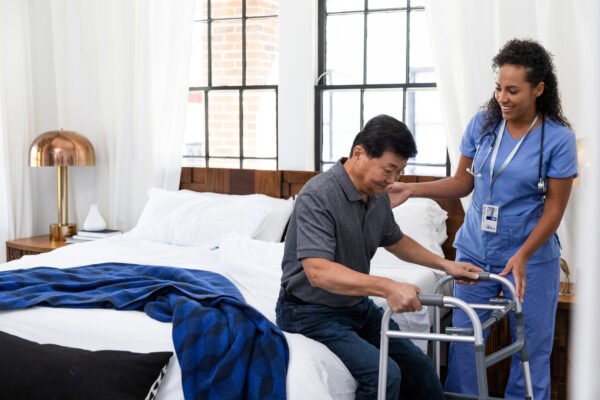
The announcement Monday of a new, $110 million round of funding for Medically Home reflects a continued expansion of hospital-level care in the home.
Medical technology company Baxter International, mobile healthcare leader Global Medical Response and Cardinal Health, which distributes medical supplies, including for at-home care, provided the latest infusion. They join Mayo Clinic and Kaiser Permanente as strategic investors and will have representation on Medically Home’s board.
Kaiser and Mayo are also providing additional funds on top of the $100 million they invested in Medically Home in May 2021 to grow its operations and give more hospitals access to its care model. The Boston-based company provides the technology and platform for clinicians to work remotely with medical staff in patients’ homes to treat higher-acuity conditions, from Covid-19 to heart failure and cancer.
The model has been gaining traction over the past two decades, but the pandemic supercharged growth, as Covid-19 made hospitals and clinics a dangerous place to be as an infectious disease spread. The pandemic has also tested the capacity of hospitals across the country. Investors are responding to both healthcare needs exceeding hospital bed counts and consumer demand to expand what types of medical treatment can be provided in the comfort of one’s home.
Broad federal regulatory changes during the pandemic have created the flexibility for higher level care to be offered in the home, while detailing how to do that safely. Medically Home’s own model features 24/7 medical command centers staffed by nurses and doctors, who work with teams of nurses, paramedics and technicians in the field. Many patients prefer to be cared for in their homes, and the hospital-at-home care model has been shown to have increased clinical benefits in comparison to hospitalization. That includes reduced readmissions and a decrease in acquired infections.
Responding to the changing consumer and healthcare landscape, many medical organizations and some payers are now looking more deeply at what kind of hospital-level care can be provided at home. Some hospitals have created their own programs, while companies like Current Health offer platforms that support hospital at home programs.

A Deep-dive Into Specialty Pharma
A specialty drug is a class of prescription medications used to treat complex, chronic or rare medical conditions. Although this classification was originally intended to define the treatment of rare, also termed “orphan” diseases, affecting fewer than 200,000 people in the US, more recently, specialty drugs have emerged as the cornerstone of treatment for chronic and complex diseases such as cancer, autoimmune conditions, diabetes, hepatitis C, and HIV/AIDS.
To date, more than 7,000 patients have been treated using Medically Home’s platform, according to the company, which says utilization is growing rapidly.
“The addition of these strategic national partners powerfully strengthens our logistics capability which our health system providers need to safely and reliably care for patients in their homes,” Rami Karjian, chief executive officer of Medically Home, said in the news release about the latest investment. “The accelerating decentralization of high acuity care from hospitals and other institutional sites to an ever-increasing number of patient’s homes enabled by Medically Home validates the importance of an ecosystem of healthcare partners working together on behalf of patients and the clinicians that care for them across the country.”
Beyond funds, each strategic partner is a piece to a puzzle that’s seeking to support seamless high acuity care in homes. Medically Home’s partnership with GMR, for example, has already allowed it to add more clinicians in the field, while its partnership with Baxter gives it access to a broader array of medical and digital health solutions.
“Baxter’s strategic investment in Medically Home will help advance our vision to transform healthcare by accelerating access to hospital-level care at home,” Giuseppe Accogli, executive vice president and chief operating officer at Baxter, said in the news release. “The Covid-19 pandemic reinforced the value of helping clinicians deliver the best possible care for patients at home, and we are thrilled to help Medically Home expand its unique care model while furthering innovation in digital health and monitoring technologies and solutions.”
Photo: SDI Productions, Getty Images












